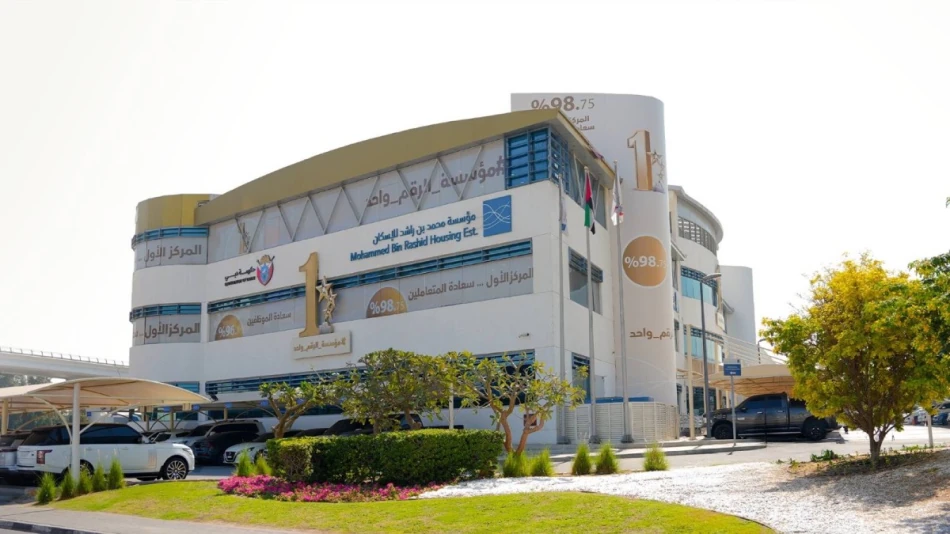
Sheikh Mohammed's Housing Authority Wins 'Best Workplace' Award Globally
Dubai Housing Authority Becomes World's First Housing Institution to Achieve Global Workplace Excellence
The Mohammed bin Rashid Housing Establishment has set a new global benchmark by becoming the first housing institution worldwide to receive the prestigious "Great Place to Work" certification, achieving an exceptional 99% employee satisfaction score for the second consecutive year. This milestone positions Dubai as a leader in government workplace innovation and signals a broader transformation in how public sector organizations can compete for top talent in an increasingly competitive regional market.
Record-Breaking Achievement Sets New Standards
The Dubai-based housing authority's achievement extends beyond mere certification. The institution secured the top position across the Middle East within the medium-sized organizations category, outperforming numerous government and private sector entities across the region. This 99% satisfaction rate places it among the highest-performing organizations globally, a remarkable feat for any public sector institution.
The Great Place to Work Institute, headquartered in the United States, represents one of the most rigorous workplace assessment organizations globally. Its evaluations span millions of employees across thousands of companies in approximately 100 countries, making this recognition particularly significant for regional government institutions seeking to modernize their operations.
Strategic Implications for Regional Competition
This achievement arrives at a critical time for Gulf states competing to attract and retain top talent. As the UAE positions itself as a global hub for innovation and business, government institutions like the Mohammed bin Rashid Housing Establishment are demonstrating that public sector organizations can match or exceed private sector workplace standards.
The timing coincides with broader regional initiatives across the Gulf to diversify economies and reduce dependence on oil revenues. High-performing government institutions become crucial assets in this transformation, particularly in sectors like housing and infrastructure development that directly impact economic competitiveness.
Five Pillars of Excellence
The certification evaluates organizations across five core dimensions: credibility, respect, fairness, pride, and camaraderie. Additional assessment criteria include innovation capacity, change flexibility, leadership support, and customer service capabilities. These metrics align closely with Dubai's broader smart city initiatives and government excellence programs.
Market and Investment Perspective
For investors and market observers, this development signals several important trends. First, it demonstrates the UAE's commitment to institutional excellence that could enhance the country's attractiveness for foreign direct investment. Strong government institutions reduce operational risks for businesses and create more predictable regulatory environments.
The housing sector specifically benefits from this recognition, as institutional credibility directly impacts real estate market confidence. A well-functioning housing authority can accelerate project delivery, improve transparency, and enhance overall market efficiency—factors that matter significantly to real estate developers and investors.
Comparative Regional Context
While Singapore and other competitive economies have long emphasized government efficiency, the UAE's approach of applying private sector excellence standards to government institutions represents a distinctive model. This contrasts with traditional government modernization efforts that focus primarily on digital transformation or process automation.
The achievement also positions Dubai favorably against other regional financial centers competing for the same talent pool. As remote work and flexible employment arrangements become standard expectations, government institutions that can demonstrate superior workplace cultures gain significant advantages in recruitment and retention.
Long-term Implications
Acting CEO Mohammed Al Shehi emphasized that this recognition reflects sustained leadership vision and investment in human capital. For the broader UAE economy, such institutional excellence creates positive spillover effects, potentially influencing workplace standards across both public and private sectors.
The consecutive years of achievement suggest this represents sustainable transformation rather than temporary improvement, indicating that the institution has successfully embedded cultural changes that should persist over time. This consistency becomes particularly valuable as the UAE continues expanding its global economic partnerships and seeking to attract international organizations to establish regional headquarters in Dubai.
Most Viewed News

 Sara Khaled
Sara Khaled






